| | | OFFLINE | | Post: 19.039
Post: 1.686 | Registrato il: 28/08/2005
Registrato il: 20/01/2009 | Administratore | Utente Veteran | |
|
 GENERAL AUDIENCE TODAY
GENERAL AUDIENCE TODAY
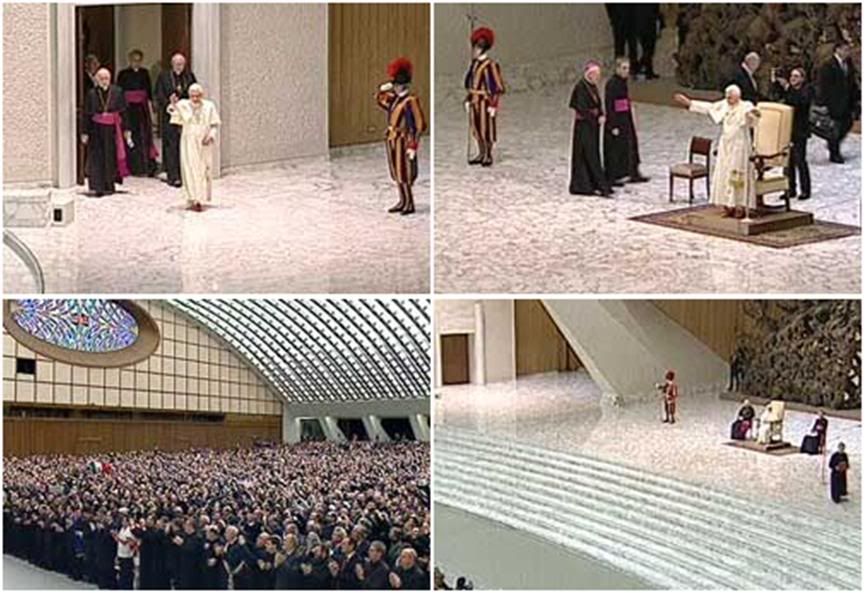
The Holy Father's catechesis today at the Aula Paolo VI was on Rupert of Deutz. Here is how he synthesized it in English:
In our catechesis on the Christian culture of the Middle Ages, we now turn to Rupert of Deutz, an outstanding theologian of the twelfth century.
Rupert experienced at first hand the conflict between the Empire and the Church linked to the investiture crisis, and he played a significant role in the principal theological debates of his day.
He forcefully defended the reality of Christ’s real presence in the Eucharist, and insisted that the origin of evil is to be found in man’s mistaken use of freedom, not in the positive will of God.
Rupert also contributed to the medieval discussion of the purpose of the Incarnation, which he set within a vast vision of history centred on Christ.
His teaching on the dignity and privileges of the Virgin Mary, presented within a broad ecclesiological context, would prove influential for later theology and find an echo in the doctrine of the Second Vatican Council.
Rupert’s ability to harmonize the rational study of the mysteries of faith with prayer and contemplation makes him a typical representative of the monastic theology of his time.
His example inspires us to draw near to Christ, present among us in his Word and in the Eucharist, and to rejoice in the knowledge that he remains with us at every moment of our lives and throughout history.
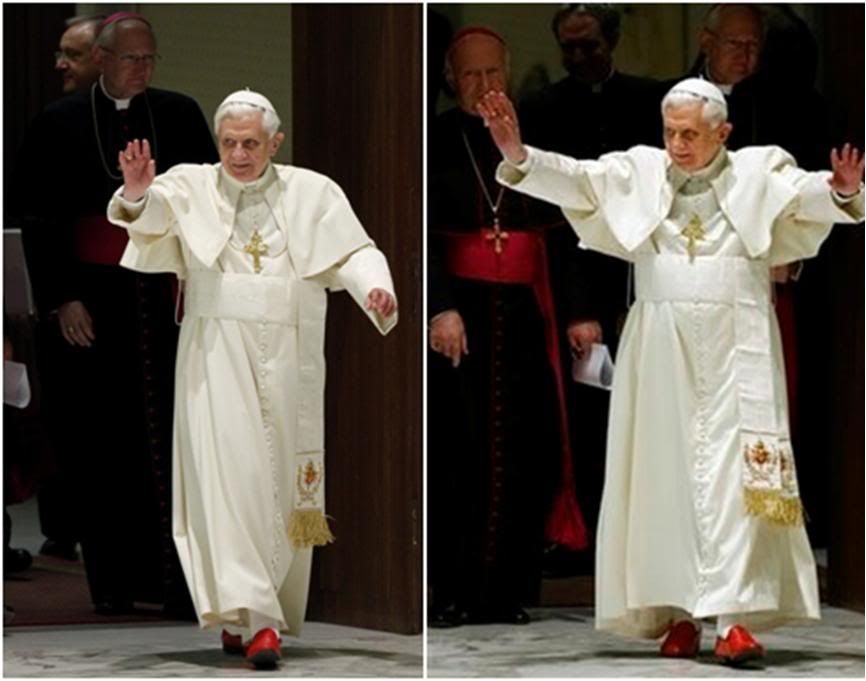
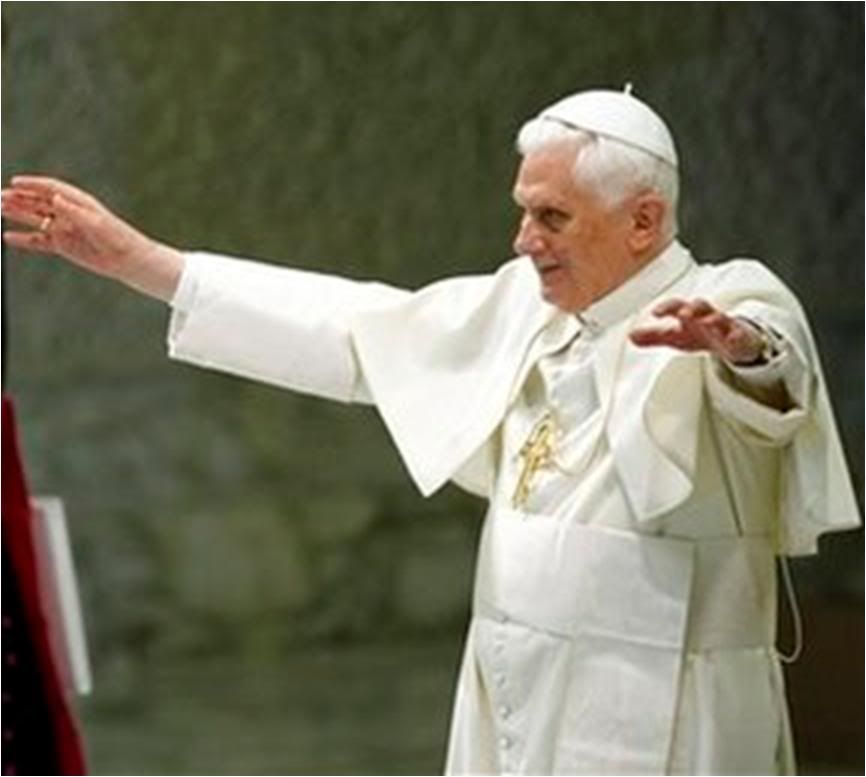
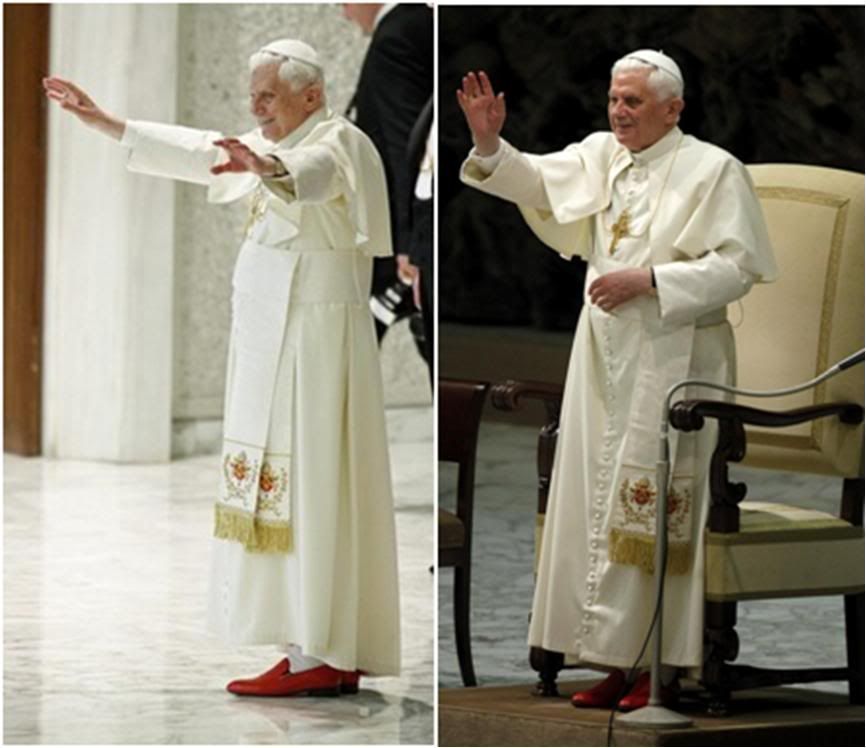
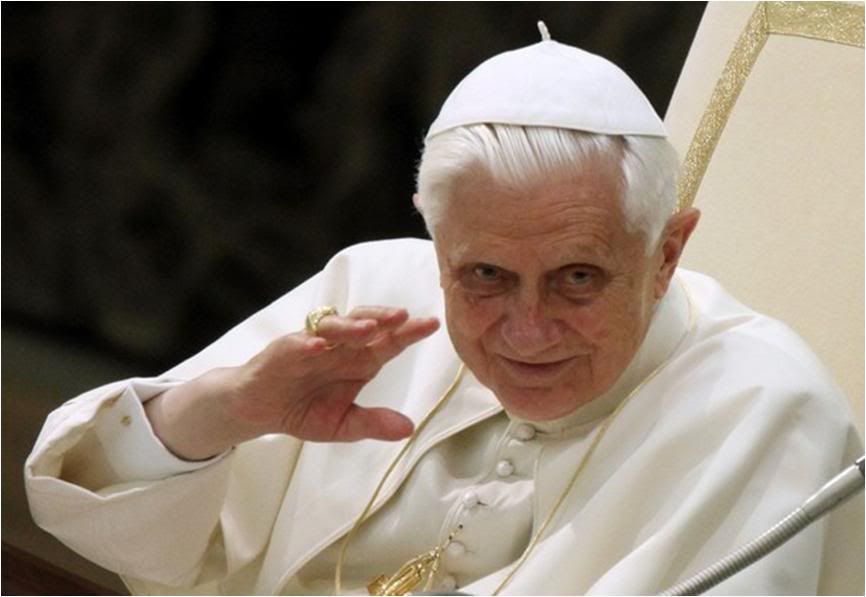
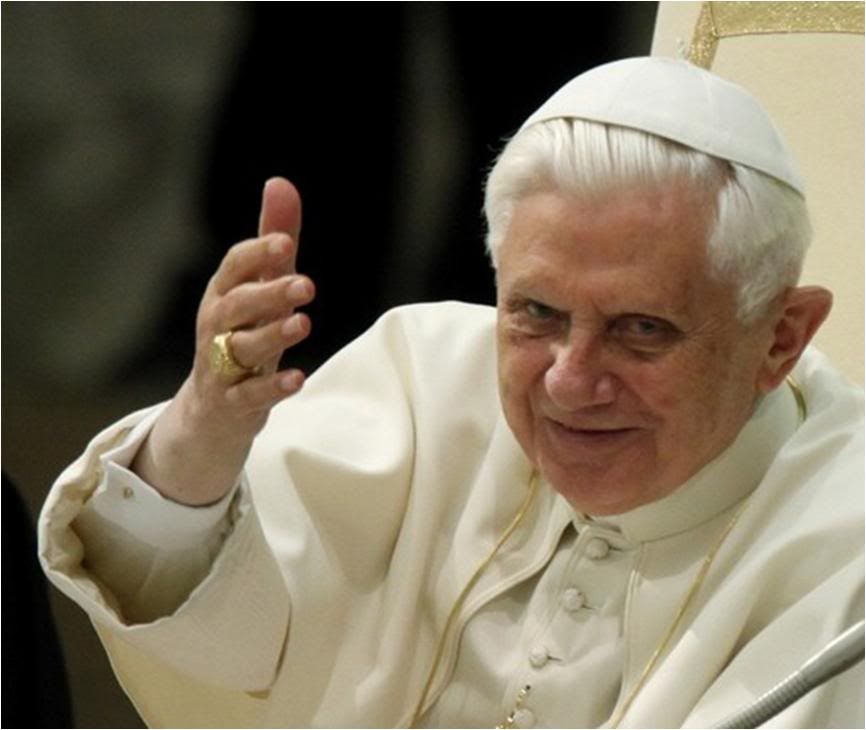
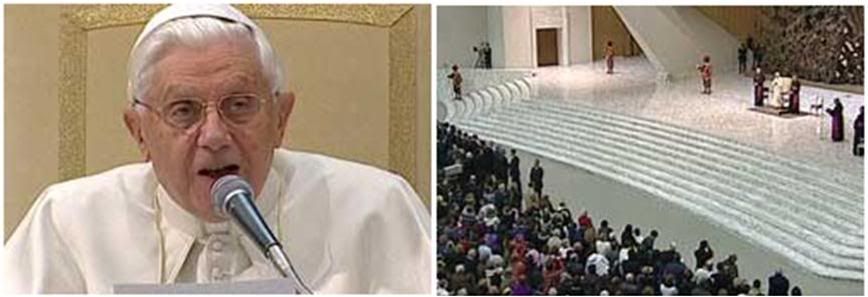
Here is a full translation of today's catechesis:
Dear brothers and sisters!
Today we make the acquaintance of another Benedictine monk of teh 12th century. His name is Rupert of Deutz, a city near Cologne and site of a famous monastery.
Rupert speaks of his own life in one of his most important works, entitled The glory and the honor of the Son of man which is a partial commentary on the Gospel of Matthew.
While still a boy, he was welcomed as an 'oblate' to the Benedictine monastery of St. Lawrence in Liege (Belgium), according to a practice of the time in which, as a gift of God, families entrusted one child to the monks to be educated.
Rupert always loved the monastic life. He learned Latin promptly to study the Bible and to enjoy liturgical celebrations better. He distinghuished himself for a most integral moral rectitude and for his strong attachment to the See of St. Peteer.
His era were marked by conflicts between the papacy and the Empire due mainly to the so-called 'battle over invetiture' in which - as I referred to in other catecheses - the Papacy wished to prevent bishops' nominations and the exercise of their jurisdiction from being dependent on civilian authorities, who were largely motivated by political and economic interests, certainly not pastoral.
The Bishop of Liege, Othbert, resisted the Pope's directives and exiled Berengar, abbot of St Lawrence monastery, because of his loyalty to the Pope.
Rupert lived in that monastery, and did not hesitate to follow his abbot into exile, and only when Othbert returned to full communion with the Pope, did Rupert return and became a priest. Until then, he had avoided ordination by a bishop in dissension with the Pope.
Rupert teaches us that when controversies arise in the Church, reference to the Petrine ministry guarantees fidelity to the right doctrine, which gives serenity and interior freedom.
After the dispute with Othbert, Rupert would be constrained to leave his monastery two more times. In 1116, his adversaries wanted him brought to trial. Although he was absolved of every charge, Rupert chose to leave for Siegburg where he remained some time.
But since the controversies had not ended by the time he returned to the monastery in Liege, he decided to settle in Germany. Named abbot of Deutz in 1120, he remained there till his death in 1129. He only left Deutz once to make a pilgrimage to Rome in 1124.
A prolific writer, Rupert left us many works that are still of great interest today, if only because he was active in various important theological discussions of his time.
For example, he intervened with resolve in the eucharistic controversy which had led in 1077 to the condemination of Berengar of Tours. The latter had a reductive interpretation of the presence of Christ in the Sacrament of the Eucharist, calling it merely symbolic.
The term 'trans-substantiation' had not yet entered the language of the Church at the time, but Rupert, at times using daring expressions, became a determined supporter of the reality of the eucharistic Presence, and particularly in a work entitled De divinis officiis (The divine offices), he affirmed the continuity between the Body of Christ as the Word incarnate and that present in the Eucharistic species of bread and wine.
Dear brothers and sisters, I believe we should think about this in our time: even today, the danger exists of redefining the Eucharistic reality, namely, to consider the Eucharist almost solely as a rite of communion, of socialization, too easily forgetting that truly present in the Eucharist is the Risen Christ - with his resurrected Body - who places himself in our hands to draw us out of ourselves, incorporate ourselves into his immortal body and thus lead us to the new life.
This great mystery - that the Lord is present in all his reality in the eucharistic species - is a mystery to adore and to love ever anew!
I wish to cite here the words of the Catechism of the Catholic Church which bears the fruit of 2000 years of meditation and theological reflection on the faith:
In the most blessed sacrament of the Eucharist "the body and blood, together with the soul and divinity, of our Lord Jesus Christ and, therefore, the whole Christ is truly, really, and substantially contained. (CCC, 1374)
Even Rupert, with his reflections, contributed to this precise formulation.
Another controversy in which the Abbot of Deutz became involved was the problem of reconciling the goodness and omnipotence of God with the existence of evil. If God is omnipotent and good, how can we explain the reality of evil?
Rupert reacted to the position taken by the teachers of the theological school of Laon (France), who, in a series of philosophical arguments, distinguished 'approval' and 'permission' in the will of God, concluding that God allowed evil without approving it, and therefore, against his will.
Rupert rejected the use of philosophy which he considered inadequate for such a great problem, and remained faithful to the Biblical narration.
He starts from the goodness of God, the truth that God is supremely good and can only wish what is good. And so, Rupert identifies the origin of evil in man himself and his mistaken use of human freedom.
In confronting this issue, Rupert writes pages filled with religious inspiration to praise the infinite mercy of the Father, the patience and the benevolence of God towards man as sinner.
Like other theologians of the Middle Ages, Ruperto himself asked: Why did the Word of God, the Son of God, become man? Some - many - answered by explaining the Incarnation of the Word as the means to repair man's sin.
But Rupert, with a Christocentric view of the history of salvation, broadens the perspective, and in a work entitled The glorifgication of the Trinity, he maintains that the Incarnation, central event of all history, is foreseen in eternity, independent of man's sin, in order that all of Creation could give praise to God the Father and love him as one family gathered around Christ, Son of God.
Thus, he saw in the woman with child mentioned in the Apocalypse the entire history of mankind which is oriented towards Christ, just as conception is oriented towards birth - a concept that would be developed by other thinkers and valued even in contemporary theology, which affirms that the history of the world and mankind is a concept oriented towards the coming (delivery) of Christ.
Christ is always at the center of the exegetical explanations made by Rupert in his commentaries on the books of the Bible, to which he had dedicated himself with great diligence and passion.
Thus he rediscovered the admirable unity in all of the events in the history of salvation, from creation to the final consummation of time: "All Scripture," he wrote, "is one book that leads to the same end [the divine Word], that comes from one God, and that was written by one Spirit" (De glorificatione Trinitatis et processione Sancti Spiritus I,V, PL 169, 18).
In interpreting the Bible, Rupert did not limit himself to repeat the teachings of the Fathers, but showed originality. For example, he was the first writer to identify the Spouse in the Song of Songs with the Blessed Mary.
Thus his commentary on this book of Scripture is a kind of summa Mariologica which presents the privileges and excellent gifts of Mary.
In one of the most inspired passages of his commentary, Rupert writes: "O most beloved among the beloved, Virgin of virgins, what is it about you that your beloved Son praises, and that the entire choir of angels exalts? They praise your simplicity, purity, innocence, doctrine, modesty, humility, integrity in mind and body - that is to say, your uncorrupted virginity" (In Canticum Canticorum 4,1-6, CCL 26, pp. 69-70).
Rupert's Marian interpretation of the Song of Songs is a happy example of the harmony between liturgy and theology. Indeed, various passages of this Biblical book were already used in liturgical celebrations of Marian feasts.
Moreover, Rupert was careful to situate his Mariological doctrine in ecclesiological doctrine. In other words, he saw Mary as the most holy part of the entire Church.
That is why my venerated predecessor, Paul VI, in his address to close the third session of the Second Vatican Council solemnly proclaiming Mary as the Mother of the Church, cited a proposition taken from Rupert's works which defined Mary as the portio maxima, portio optima - the most excellent and the best part - of the Church(cfr In Apocalypsem 1.7, PL 169,1043).
Dear friends, with these quick flashes, we realize that Rupert was a fervent theologian who was gifted with great depth. Like all the representatives of monastic theology, he was able to conjoin the rational study of the mysteries of the faith with prayer and contemplation, which is considered the peak of any knowledge of God.
He himself spoke at times of his mystical experiences, as when he confides the ineffable joy of having perceived the presence of the Lord: "From that brief moment," he states, "I experienced how true it is what he himself said: 'Learn from me who am gentle and humble of heart'" (De gloria et honore Filii hominis. Super Matthaeum 12, PL 168, 1601).
We, too, each in our own way, can meet the Lord Jesus who incessantly accompanies us along our journey, who is present in the Eucharistic bread and in his Word, for our salvation.
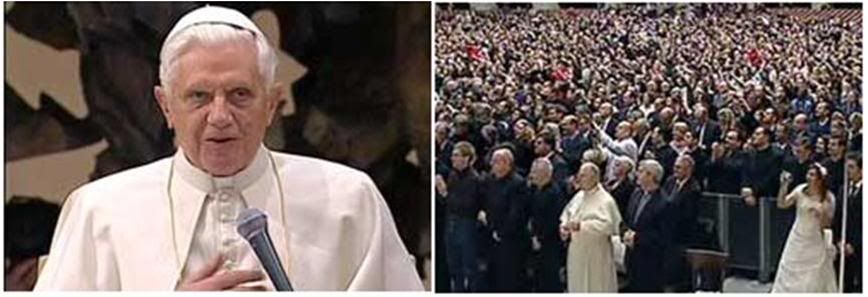
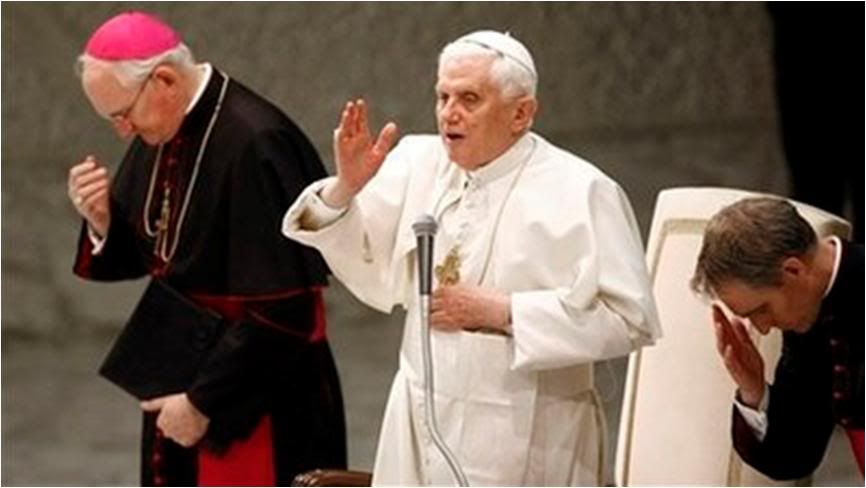
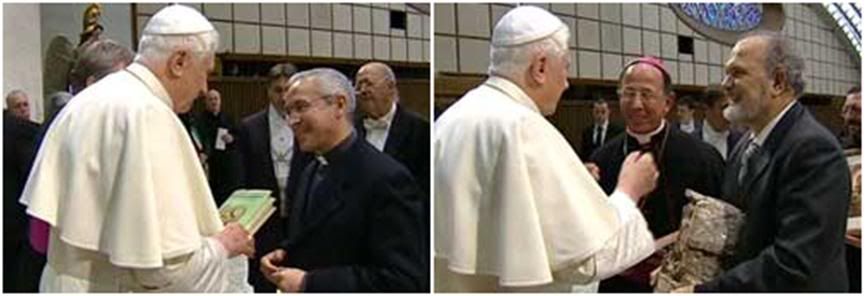 One day after his topical and very forceful remarks to the City of Rome - and to the world - at Piazza Spagna yesterday on the feast of the Immaculate Conception, Benedict XVI follows up with a catechesis that is just as topical and forceful, this time addressed to priests and theologians, especially. who dilute the faith as a mistaken way to make it more 'attractive' to the faithful.
One day after his topical and very forceful remarks to the City of Rome - and to the world - at Piazza Spagna yesterday on the feast of the Immaculate Conception, Benedict XVI follows up with a catechesis that is just as topical and forceful, this time addressed to priests and theologians, especially. who dilute the faith as a mistaken way to make it more 'attractive' to the faithful.
Today, the Italian media is awash with commentaries on the Piazza Spagna remarks, since it was in part directed at the wrong uses of communications and information media. I eill try to translate the best ones later.
Despite writing about the faith and preaching it all his life, this Pope obviously devotes great thought and effort to crafting his texts, not so much for the content, with which he has had a lifetime of familiarity, but in order to express the message in words that will go to the heart of the issue - and of the faith - while touching the heart and mind of those who get the message.
Surely there are world leaders out there who may occasionally take an active part in crafting the texts they deliver, but I dare say none as regularly and consistently as Benedict XVI, who drafts and writes all his major texts himself.
Perhaps that is why no Pope in recent memory has communicated the faith every day and every way the way Benedict XVI has done - always mindful of the 'little people' whose 'simple faith' needs to be reinforced and safeguarded, and therefore, using language that can be understood by everyone.
BENEDICTUS QUI VENIT IN NOMINE DOMINI!
[Modificato da TERESA BENEDETTA 09/12/2009 22:15] |